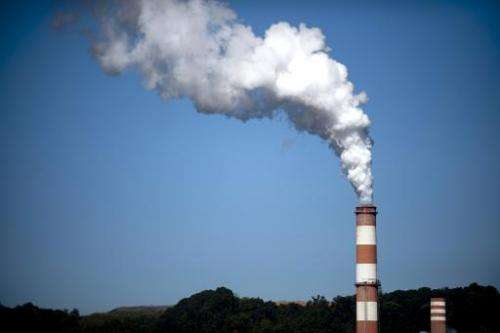US top court upholds cross-state air pollution rule

President Barack Obama's administration scored a major victory Tuesday when the US Supreme Court revived regulation limiting harmful emissions that blow across state lines.
A coalition of six progressive and conservative justices clinched the 6-2 vote overturning a lower court decision that a 2011 Environmental Protection Agency (EPA) rule overstepped the agency's authority.
At issue are control measures on emissions of sulfur dioxide and other greenhouse gases that are sometimes blown by the country's prevailing winds across state boundaries, leaving upwind states in violation of clean air standards.
The Cross-State Air Pollution Rule, opposed by industry groups and upwind states such as Michigan, Ohio and Texas, requires 28 states to reduce power-plant emissions that harm downwind states' air quality.
It emerges from the Clean Air Act, a centerpiece of the Obama administration's environmental agenda.
Backed by nine states and six cities, the Obama administration argued that the emissions were responsible for one out of 20 deaths in the United States and thousands of cases of asthma.
The Environmental Defense Fund said the "life-saving" rule will save up to 34,000 lives, prevent 400,000 asthma attacks, avoid 1.8 million employee sick days and provide benefits of $120-280 billion each year.
In its ruling, the US Court of Appeals for the District of Columbia Circuit in Washington had said the EPA's approach in setting pollution limits forced certain states to reduce more emissions than they contribute.
The EPA rule determined the cost allocations not just on how much pollution a state produces but also on how affordably the state can cut the emissions.
Writing for the majority, Justice Ruth Bader Ginsburg said the EPA had followed the "plain text" of the Clean Air Act in enacting the measure also known as the Transport Rule.
"EPA's cost-effective allocation of emission reductions among upwind states, we hold, is a permissible, workable and equitable interpretation" of the law, Ginsburg wrote in the 32-page opinion.
Justice Antonin Scalia, dissenting alongside Justice Clarence Thomas, blasted the majority's "undemocratic revision of the Clean Air Act," criticizing its acceptance of the EPA's cost-based allocation.
Justice Samuel Alito was recused in the case.
"Today's decision feeds the uncontrolled growth of the administrative state at the expense of government by the people," Scalia said in a separate statement read from the bench.
Senate Environment Committee Chairwoman Barbara Boxer hailed the "major victory in the fight for clean, healthy air."
"By making our air healthier to breathe, EPA's rule will save lives and prevent up to 34,000 premature deaths a year," she added.
© 2014 AFP


















